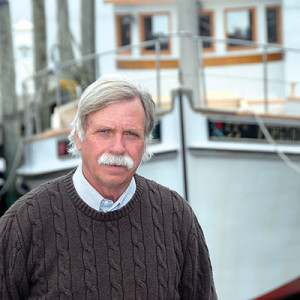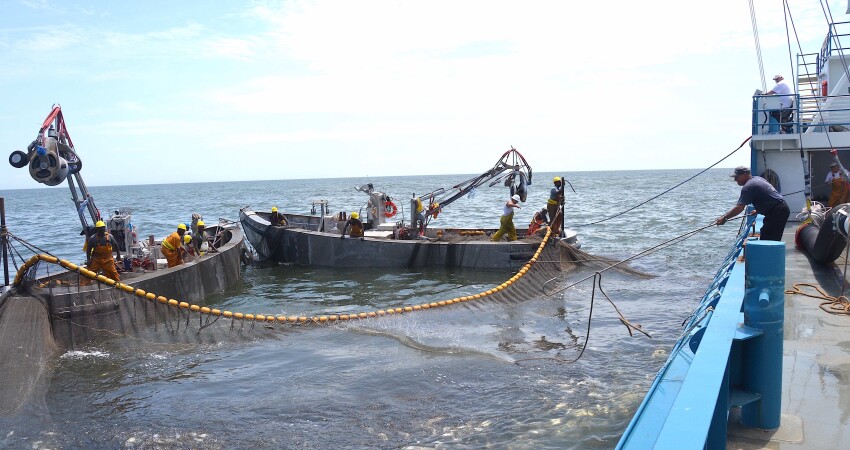Virginia-based Ocean Fleet Services and Ocean Harvesters filed a “motion to dismiss” a $2 billion lawsuit against seafood giant Cooke Inc. of New Brunswick, Canada, that claimed the firm violated U.S. foreign ownership laws with the acquisition in 2017 of Omega Protein in Reedville, Va.
The lawsuit, filed on July of 2021 by plaintiffs W. Benson Chiles and Chris Manthey and unsealed in April 2024, alleges Cooke Inc., Omega Protein, Alpha Vessel Co. Holdings Inc., Ocean Fleet Services, Ocean Havesters, have been violating the American Fisheries Act (AFA) of 1998 and the 1920 Jones Act that allow only U.S. citizens to fish in U.S. waters.
The suit stems from an approximately $500 million purchase of Omega Protein of Reedville in 2017 by Cooke Inc. The lawsuit alleges that part of the deal was an illegal arrangement that gave Cooke improper control of the company and the fishing vessels.
The fishing companies’ motion to dismiss, filed July 9 in U.S. District Court in New York, alleges that the suit “lacks factual basis, are speculative, and are quite simply inaccurate.”
“From the moment we became aware of this case, we have been eager to show that the allegations are inaccurate,” says an Ocean Harvesters spokesman. “Our legal filing underscores several key misstatements from the complaint and offers concrete evidence that they are false.”
The lawsuit alleges Cooke Inc. was involved in a “figurehead fraud scheme” creating a Delaware shell corporation to avoid violation of the AFA citizenship requirement and that “instead of simply acquiring Omega and owning its vessels (Cooke) restructured the entire acquisition to create an illusion of compliance with the AFA citizenship requirement.”
Motion to Dismiss
The 31-page “motion to dismiss” counters the allegations by stating that “stripped of the hyperbolic innuendo, this is a case about entities engaging in a routine business transaction, with the express authorization of a fully informed industry regulator, involving the purchase of fish processing facilities and the sale of fishing vessels.”
It further stated that “in 2017, Cooke Inc. acquired the land-based processing facilities of Omega Protein Inc. and Omega Protein Corporation (in Reedville). Prior to the transaction, Omega also owned a fleet of vessels. Omega transferred the fleet to Ocean Harvesters and sold that entity to Ocean Fleet Services.”
“Under the AFA, U.S. citizens must have at least 75 percent interest in those vessel,” it states. “As a result of its impending ownership by a Canadian company, Omega transferred the fleet to Ocean Harvesters and sold that entity to Ocean Fleet Services. In turn, Ocean Fleet Services is 80 percent owned by Seth Dunlop, who is a U.S. citizen. Ocean Harvesters operates the vessels and sells the fish that it catches to Omega, (owned by Cooke Inc.), pursuant to a fish supply agreement.”
“The net result of the transaction, which is a U.S. citizen-owned fleet entering into an agreement to sell its catch to a foreign-owned processor, is expressly permitted under federal law."
The motion also states that “Every step of this arrangement was expressly approved by the U.S. Maritime Administration (MARAD) of the Department of Transportation, which conducted a thorough pre-transaction review in 2017 to confirm compliance with the AFA’s citizenship requirement.” MARAD is the federal agency that determines whether applicants satisfy AFA vessel citizenship requirements.
The motion also states that MARAD has continued to issue citizenship determinations confirming compliance with AFA’s requirements, and the Coast Guard has continued to issue certificates of documentation on Ocean Fleet Services’ menhaden vessels.
‘Fraudulent scheme’
Chiles’ and Manthey’s lawsuit alleges that “as a result of a fraudulent scheme, defendants have illegally harvested from United States waters many millions of dollars worth of (menhaden) fish to which they are not entitled.”
The suit alleges that the deal between Cooke Inc. and Omega and the 80 percent fleet ownership going to Seth Dunlop was part of a fraudulent scheme to bypass U.S. law that protects U.S. fishing grounds from foreign fishing and that Cooke Inc. had not provided MARAD with the proper family relationship information of Seth Dunlop to the Cooke family.
The fishermen’s motion to dismiss countered that by stating, “the July and October 2017 submissions both disclosed to MARAD, prior to approval of the 2017 transaction, that Seth Dunlop had worked for the last 5 years in the development of the global fishing operations of the Cooke family as an employee of a Cooke entity and that he is related by marriage to one of the three family members that control Cooke.
“MARAD with full knowledge of the nature of the transaction and its purpose, gave its approval (as required by federal law) and the suit has not identified a single material misstatement or omission,” it states.
$2 billion penalty
The lawsuit calls for the defendants to pay $2 billion in U. S. government penalties. The motion to dismiss states that for Cooke Inc. to be required to pay any amount of government penalties is “demonstrably false” unless the government requires it.
“Only the government can assess such penalties and the government has never done so or attempted to do so here,” it states.“Instead, after fully reviewing . . . allegations, the government declined to intervene in these proceedings. It is well established that (plaintiffs) cannot use FCA litigations to seek recovery of unassisted penalties that the government has declined to pursue.”
Although the U.S. Government and other federal agencies are not involved in the suit, plaintiffs are suing on behalf of the United States government, including MARAD and the United States Coast Guard.
Manthey is a professional investigator and researcher. In 1993, Manthey co-founded Back Track Report, a private investigation firm in New York focused on pre-deal background research on corporate executives.
Chiles works in the fisheries management industry and monitors issues relating to commercial and recreational fishing in U.S. waters. Chiles occasionally receives non-public information regarding corporations operating in the U.S. commercial fishing industry, including defendants Cooke Inc. and Omega, the lawsuit states.







